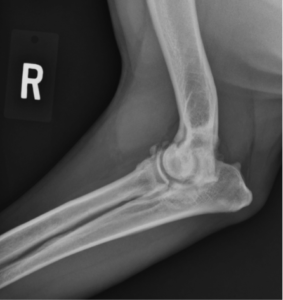Canine Oseoarthritis Management

Written by Staff Veterinarian
What is Arthritis?
Osteoarthritis is an irreversible, chronic condition in our canine patients. However, with appropriate medical therapy, most pets can live long, happy, pain-free lives. There are numerous conditions that can lead to the development of osteoarthritis including: hip dysplasia, cranial cruciate ligament injuries, osteochondrosis dissecans, and elbow dysplasia (fragmented medial coronoid processes, ununited anconeal processes, and elbow incongruity). There are numerous ways to help limit the effects of osteoarthritis on your pet’s life.
- This x-ray of a healthy elbow joint, shows the separation between the different points of contact in the elbow. The dark space around the ball is synovial or joint fluid.
- The ball joints of the hip should be separated from the socket (acetabulum) by joint fluid (synovial fluid). The absence of synovial fluid causes friction, pain, and impacts fluidity of movement in the hip joint.
How Can I Manage The Impact of Arthritis In My Pet Without Surgery?
Weight Loss:
Excess weight places undue stress on the joints and can accelerate the progression of arthritis. Even if your pet is not overweight, decreasing his weight will decrease the stress on his joints. The primary components of a weight loss plan include a decrease in caloric intake and an increase in quality exercise.
Decreasing caloric intake can be accomplished by decreasing the total volume of food consumed or by switching your pet to a lower calorie diet. Prescription diets (such as Hill’s r/d or w/d or Purina OM) can be used until a desired weight is achieved.
Increasing activity level also helps with weight loss by increasing the number of calories burned.
In order to establish a successful weight loss program, it is imperative that you remain in close communication with your primary veterinarian and schedule weekly to bimonthly weight checks. Once a routine is established, the veterinarian can fine-tune your pet’s weight loss program to a safe and acceptable rate.
Ideally your pet would be limited only to his prescribed weight loss diet but we understand that some pets enjoy food treats in addition to the regular food. Please avoid all over the counter pet treats as these are usually high in fat, salt, and calories. Instead consider feeding such things as frozen green beans or carrots in small amounts. You can also use dog food as treats, remembering to decrease the amount fed at mealtime as well.
In addition to appropriate caloric restriction and exercise, an oral diet medication (Slentrol® (Pfizer)) can be prescribed to help control hunger and further accelerate weight loss. This medication is available only by prescription and is not right for every dog, so please discuss the use of this medication with your primary veterinarian.
Exercise:
Promoting exercise in your arthritic pet is very important for weight loss and helps lubricate the joints. We recommend low impact exercises, such as controlled leash walks or swimming. Walks on softer surfaces, such as grass, will decrease the impact on his or her joints, as well. We recommend starting slowly with any activity and gradually working your pet up to additional activity. This may mean starting with 5 minute walks, three times per day, and gradually increasing by 5-10 minutes each week until you reach 30 minutes, three times daily.
If your pet has lost significant muscle mass, physical therapy with a pool or underwater treadmill may be beneficial to improve muscle mass prior to attempting walks on your own. If you are interested in water therapy with a pool or treadmill, ask us for a recommendation for a local rehabilitation facility that specialize in aquatherapy.
If at any time your pet experiences increased lameness or pain following activity, please stop all exercise for 24 hours. If the lameness continues, please see your veterinarian or any of the veterinary surgeons at one of our specialty referral hospital for a physical examination. If the lameness resolves you may resume activity at a lesser amount and gradually work back up to longer walks.
Nutraceuticals:
Nutraceuticals, herbal/natural products and complimentary /alternative medications are products that are intended to aid in disease management, but they are not regulated by the Food and Drug Administration (FDA). Rigid quality control standards are not required for these products, and as a result substantial variability can occur in both the potency and the purity of these products. Few well-controlled clinical studies have been performed in animals documenting the use of these products; however, some products have been shown to have beneficial effects in humans and animals. When choosing a product labeled for human-use for your pet, always consult with your veterinarian. The United States Pharmacopoeia (USP) is a standard-setting authority that certifies nutraceutical products and requires testing to ensure the purity, potency, and quality of finished products. Look for their stamp of quality on products you buy.
Glucosamine/Chondroitin sulfate: These compounds are naturally occurring within the joints. They are part of the structure of normal cartilage and are thought to help with cartilage repair. Glucosamine/chondroitin supplementation has been shown to improve comfort/pain control in humans. No similar studies have been performed in canine or feline patients. Several products have been shown to contain appropriate levels of available glucosamine and chondroitin including Cosequin®, Dasuquin™ (by Nutramax) and Seraquin® (by Boehringer Ingelheim). These are available only through veterinarians. The ideal starting dose would be 1500 mg per day of the glucosamine portion. This dose can be divided and given twice a day.
Omega 3 fatty acids: These are a family of unsaturated fatty acids that cannot be made by the body and are required in the diet. These include ALA, EPA, and DHA. These products are especially concentrated in certain foods like cold water fish, such as salmon, herring, mackerel, anchovies, or sardines. They are thought to help block enzymes that can degrade cartilage and reduce the creation of substances that cause inflammation. The ratio of omega 3 to omega 6 fatty acids may be more important than the actual amount of omega 3 fatty acids consumed; this is controversial and the specific ratio and dose has not been determined for our pets, but is assumed to be similar to humans. Fish oil products are especially sensitive to the effects of heat, light and oxygen exposure. Be sure to store the products exactly as is recommended. One product that has been shown to contain the labeled amount of EPA and DHA that is recommended is Omega-3 Pet™ by Nordic Naturals® but there are many products available. Currently we recommend Nordic Naturals® which can be purchased at your local health food store. When using Nordic Naturals® use the label dosage appropriate for your pet’s weight. Fish oils can be started at 1000-1200 mg per day. Many other products are available and you can consult with your veterinarian for additional options.
Adequan® (by Lutipold): This is a polysulfated glycosaminoglycan (PSGAG). PSGAGs are similar to the main component of joint fluid and cartilage. They are thought to help decrease inflammation in the joint and protect healthy cartilage. Adequan® is a prescription, water-based product to be injected into the muscle that can be given on a tapering regimen. It can be started weekly or twice a week for a month and tapered slowly over time. These can be given by your primary veterinarian, as injections to give at home, or by a surgeon at an Ethos Veterinary Health hospital.
Hyaluronic acid (HA): This is a naturally occurring substance found within joints. It is made by cartilage cells and helps support the composition of joint fluid and decrease inflammation within the joint. This product is rarely used in companion animals and is usually injected directly into the joints. There are several products containing HA that are available as food supplements, however the effectiveness of orally administered HA is unknown. There is substantial variability between products and an HA supplement should be chosen only when other products have not been effective.
Diets:
Several commercially prepared prescription diets are available that contain high levels of omega-3 fatty acids and glucosamine/chondroitin. They are additionally formulated to help decrease inflammation. These diets include Hill’s Science Diet J/D, Purina JM, Iams® Veterinary Formulas Joint Health, and Royal Canin Mobility Support JS. The amount of omega-3 fatty acids contained in Hill’s Science Diet J/D eliminates the need for fatty acid supplementation. These products do not contain therapeutic levels of glucosamine/chondroitin and you should continue to supplement your pet while on these diets.
Unfortunately these diets are only formulated for dogs. Additionally, if your pet is on a hypoallergenic diet or has food allergies, these diets are not recommended as most contain chicken, rice, and wheat products. These diets are not considered weight loss formulas and care should be taken to ensure that your pet does not gain weight while on these diets.
Please contact your veterinarian or their office to purchase these prescription diets.
Non-steroidal anti-inflammatory drugs (NSAIDs):
This is a class of prescription medications that act to decrease inflammation by blocking the mediators of inflammation at a point along the pathway. By blocking these inflammatory mediators, there is also a decrease in pain. This group of drugs includes Rimadyl® (carprofen), Deramaxx® (deracoxib), Metacam® (meloxicam) and Previcox® (firocoxib). These medications act similarly to several human medications including aspirin, ibuprofen (Motrin/Advil), Aleve, and Celebrex.
NSAIDs should never be given without the supervision of your veterinarian. These products can cause serious, life-threatening side effects, even in small doses.
NSAIDs are often used intermittently to control pain secondary to osteoarthritis, but can be used on a long-term basis. It is important to monitor your pet’s kidney and liver function at least every 6 months if he or she is administered NSAIDs long term. This monitoring is important for continued treatment.
The most common complication of NSAID use is stomach/intestinal upset. If any vomiting, diarrhea, or a decrease in appetite occur while giving an NSAID, please stop their use immediately and contact your veterinarian.
Alternative Therapies:
Acupuncture: Some pet owners have described the benefits gained from acupuncture therapy.
Stem cell therapy: Stem cell therapy has recently received a large amount of attention in the press. It was initially used in horses to help stimulate the repair of tendons and ligaments. Its use in companion animals has been more recent and as of yet there has been little scientific data to prove its efficacy. We continue to monitor the objective research in the field of stem cell therapy and consider forms of appropriate treatment when they become available.
